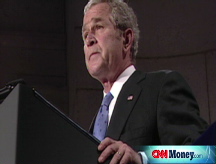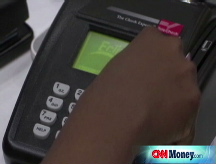The economic growth mirage
Sure, the economy grew at a decent clip in the second quarter. But economists say the gain may be temporary and warn of tougher times ahead.
NEW YORK (CNNMoney.com) -- Despite all the talk about the U.S. economy falling on hard times this year, the economy grew at a more solid pace during the second quarter.
According to an update to the second-quarter gross domestic product report released by the government Thursday, the economy grew at a 3.3% clip, up from the 1.9% annual growth rate first reported last month. Economists surveyed by Briefing.com were expecting GDP to be revised up to 2.7% in the quarter. The GDP is the broadest measure of the nation's economic activity.
Economic growth between 2.5% and 3.5% is typically viewed as the norm for a healthy economy.
But that doesn't mean that the United States has avoided a recession, some economists say. In fact, there are growing concerns that weakness will extend through the rest of this year and even into 2009.
"My feeling is that the recession started in the fourth quarter of 2007," said David Wyss, chief economist with Standard & Poor's. "I think the worst quarter will be the first quarter of 2009, which would make it a long recession."
The National Bureau of Economic Research, a research group charged with dating the start and end of recessions, looks at factors such as payrolls, industrial production, real income and sales when determining when recessions begin and end. It has yet to make a ruling about the current state of the economy.
But many economists say temporary factors, such as the more than $90 billion in economic stimulus checks that reached taxpayers during the quarter, make the jump in the second quarter an anomaly.
The economy grew at just a 0.9% rate in the first three months of the year and declined in the fourth quarter of 2007.
"Mostly what this report will say is, when you give somebody an $1,800 check, he spends it," said Wyss, referring to the tax rebate received by many families.
Among the factors behind the likely upward revision to growth in the second quarter: more business inventories than originally estimated and improved trade figures.
The trade picture was helped by reduced spending on imports other than oil and by strong exports, due to a weak dollar, that made U.S. goods more attractive overseas. This may also prove to be fleeting.
"With slowing of economies abroad, that gain from trade doesn't look sustainable," said Keith Hembre, chief economist with First American Funds.
With all this in mind, several economists say they are certain the United States is in recession, and that no one should be fooled into thinking otherwise by a strong second-quarter GDP report.
That's because it will be hard for the economy to rebound until the housing, banks and credit markets start to recover from the upheaval of the past year.
"This is a head-fake," said Kevin Giddis, managing director of investment bank Morgan Keegan, about the expected rise in GDP. "You have to reach a bottom in housing before you'll see a turn."
Lakshman Achuthan, managing director of the Economic Policy Research Institute, said that no matter how strong the second-quarter growth is, it is important for Congress to provide another round of economic stimulus to deal with continued weakness.
He argued that those who deny we're in a recession could delay the recovery because they are "not dealing with reality."
To be sure, some experts remain convinced that the United States is not in recession. But even some more bullish economists said the second quarter gain is likely to be more of a brief spike than the beginning of a sustained pick-up.
Rich Yamarone, director of economic research at Argus Research, said that the economy, while not "tearing the cover off the ball", is not "striking out either."
But he conceded that "conditions weren't that spectacular in the second quarter," mainly because of job losses and sluggish income growth outside of the tax rebates. ![]()







